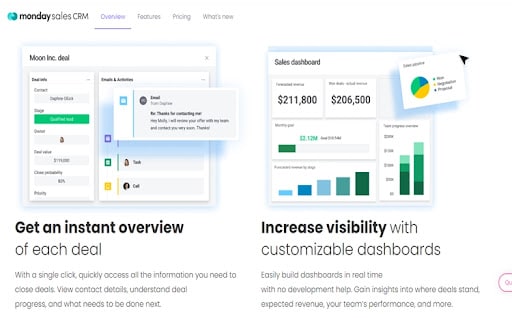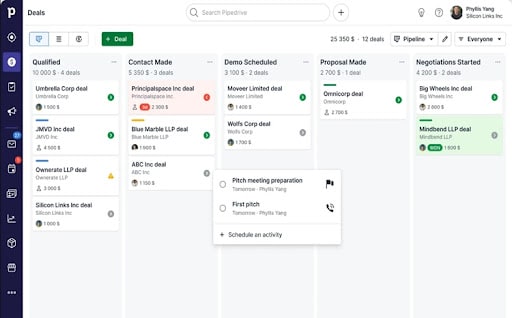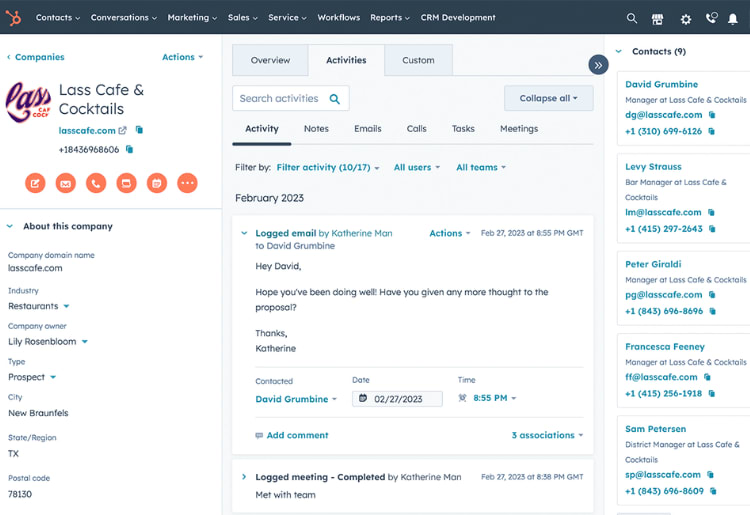What Is CRM Software and Why Does Your Small Business Need It?
Customer Relationship Management (CRM) software is a digital platform that helps businesses manage and improve customer interactions across every stage of the sales journey. It acts as a centralized system for storing customer data, automating repetitive tasks, and streamlining internal communications.
For small businesses, CRM tools provide the foundation for scaling operations efficiently. Whether you're acquiring new leads, nurturing customer relationships, or building out a formal business plan, CRM software ensures your processes are organized, data-driven, and aligned across teams.
As customer expectations rise and digital communication becomes standard, a CRM isn’t optional—it’s essential. From improving retention to increasing conversions, the right CRM can turn a startup into a growth-focused operation.
Key Insights
73% of CRM users say CRM software improved access to customer data
Businesses using CRM see a 29% increase in sales productivity
CRM adoption improves customer retention by up to 27%
Free CRM tools now offer enough functionality for solopreneurs and small teams
Types of CRM Systems Explained
1. Analytical CRM
Designed to collect, analyze, and interpret customer data. These systems help small businesses understand customer behavior patterns, segment audiences, forecast trends, and refine decision-making.
Best for: Businesses wanting to leverage data for growth, customer segmentation, and personalized marketing.
2. Collaborative CRM
Built for communication. It connects customer-facing teams (sales, marketing, support) to share real-time insights and eliminate silos.
Best for: Companies that need interdepartmental alignment and centralized communication tools.
3. Operational CRM
Optimizes the day-to-day. It automates repetitive tasks like email follow-ups, scheduling, and onboarding, enabling teams to focus on high-value activities.
Best for: Businesses aiming to streamline workflows, reduce human error, and scale faster with fewer resources.

monday sales CRM
How Much Does CRM Software Cost?
CRM pricing varies widely, based on features, users, and support levels. Here's a breakdown:
Entry-level tools: Start at $10–$20 per user/month
Mid-tier platforms: $25–$50 per user/month
Enterprise-level: $70+ per user/month
Additional Costs to Consider:
Onboarding and training fees
Integration and add-on modules
Premium support tiers
Overage charges for contacts or emails
Minimum user requirements that exceed your actual team size
Tip: Look for providers that offer discounts for annual billing or explore a free CRM for small business to reduce costs while testing fit.
Must-Have Features in CRM Software for Small Business
Contact & Lead Management
Store detailed customer profiles, lead stages, and past interactions.Sales Pipeline Tracking
Monitor where each lead is in your funnel with visual dashboards.Marketing Automation
Trigger email campaigns, follow-ups, and lead nurturing sequences automatically.Custom Reports & Dashboards
Track KPIs like deal conversion, team performance, and customer engagement.Third-Party Integrations
Connect with your existing email, accounting, and marketing tools.Mobile CRM Access
Stay productive while working remotely or on the go.User Roles & Permissions
Control access by department or job function.
How to Choose the Best CRM for Small Business Needs
1. Define Business Goals
Are you aiming to improve lead conversion, streamline onboarding, or reduce customer churn? Your CRM must align with these priorities.
2. Identify Key Features
List mission-critical features, such as sales tracking, email marketing, or appointment scheduling.
3. Assess Department Usage
CRM tools should serve all relevant departments—sales, marketing, service—not just one team.
4. Evaluate Integration Options
Ensure the CRM connects smoothly with your website, email service, accounting software, or free business plan template tools.
5. Budget for Scalability
Choose platforms with flexible tiers so you can upgrade as you grow.
6. Check Support Quality
Look for 24/7 live chat, tutorials, and a searchable knowledge base to help your team adopt quickly.
CRM Integration: Connecting with Existing Systems
Integration is one of the most powerful features of modern CRM software. Most platforms support API connections to link with:
Email providers (e.g. Gmail, Outlook)
Accounting software
Video conferencing apps
Lead generation tools
Point-of-sale (POS) systems
Small businesses benefit greatly from using CRM as a hub, connecting all essential tools for a smoother workflow and reduced manual entry.
Compare With Top10.com, Choose the Best for You
At Top10.com, we recognize the importance of thorough and accurate product and service reviews in guiding your choices. Our team, comprising editors and industry experts, conducts extensive research to provide comprehensive insights. Our content is continually updated to reflect the latest market trends, offering current information.
We provide a range of services including comparison lists and in-depth reviews, all tailored to meet your specific needs. Our goal is to empower you to make confident and informed choices.

Benefits of Including CRM in Your Business Plan
Stronger Customer Retention
Personalized interactions based on real data improve satisfaction.
Higher Revenue Potential
Automated follow-ups and lead scoring improve close rates.
Smarter Marketing Campaigns
Segment customers by behavior and automate sequences.
Faster Team Collaboration
Shared dashboards reduce back-and-forth between departments.
Clearer Decision-Making
Data-backed insights help owners allocate time and budget wisely.
Comparing the Top CRM Software
| CRM Platform | Most Recommended For |
|---|---|
HubSpot | Best CRM software overall — great all-in-one platform for sales, marketing, and service |
Pipedrive | Best for salespeople who want a clean pipeline, automation, and deal tracking |
monday sales CRM | Best for teams needing full customizability in workflows, dashboards, and integrations |
Salesforce US | Best for relationship management and enterprise-grade customer service features |
HoneyBook | Best for freelancers and solo entrepreneurs managing bookings, invoices, and clients |
ClickUp | Best for integrating CRM and project management in one visual platform |
Capsule | Best for users seeking a simple, lightweight CRM with strong contact management |
If you're choosing between our top CRM platforms, monday sales CRM, Salesforce, and HubSpot are leading contenders. Each brings a unique approach—whether you're seeking flexible workflow customization, enterprise‑grade customer management, or an all-in-one growth platform. Use this quick comparison to decide which CRM system fits your business best.
monday vs Salesforce
In the monday vs Salesforce comparison, monday shines for its intuitive, drag-and-drop customization, making it ideal for startups and growing teams who want full control over pipelines, dashboards, and tasks without complex setup. Salesforce is better suited for large organizations needing scalable CRM architecture, advanced automation, and powerful integrations with deep customer relationship capabilities.
Best for:
monday: Teams needing flexible workflows and visual project management
Salesforce: Enterprises needing deep CRM automation and customer service tools
monday vs HubSpot
The monday vs HubSpot matchup focuses on customization vs ecosystem. monday is ideal for users who want to build custom sales processes, combining CRM and project tracking in one visual platform. HubSpot offers a fully integrated suite for sales, marketing, and customer service—with robust free tools, automation, and reporting baked in.
Best for:
monday: Teams who want CRM + project management in one platform
HubSpot: Businesses seeking a unified marketing + sales ecosystem with built-in growth tools
Salesforce vs HubSpot
Salesforce vs HubSpot is a battle between enterprise power and scalable simplicity. Salesforce offers unmatched CRM depth, especially for larger sales teams and support operations. HubSpot provides a more accessible entry point with a free CRM, plus seamless marketing and service features that scale with your business.
Best for:
Salesforce: Enterprise sales organizations with complex data and service needs
HubSpot: SMBs and growing teams looking for an all-in-one platform that’s easy to adopt
To compare features, pricing, and best-fit use cases in more detail, scroll down to explore our Top 3 CRM Software Picks, where we break down the platforms side by side.
*AI was used in the creation of this content, along with human validation and proofreading.
Our Top 3 Picks
- 1Exceptional9.7
 Customizable CRM option for businessesFree TrialRead monday sales CRM Review
Customizable CRM option for businessesFree TrialRead monday sales CRM ReviewGreat for - Small to midsize businesses who need more than spreadsheets
Price - $8 per seat per month (3 seat minimum)
Free trial - 14 days
monday sales CRM makes it easy to get started with ready-made templates. You can customize almost anything to your needs without any IT help necessary. The seamless Gmail/Outlook integration means you can communicate with clients in one place, as well as log and track all your activities with them.
The platform is super intuitive but also capable of handling any complex processes, whether it be sales, project management, tasks, and more. monday sales CRM saves you time by automating manual work.
monday sales CRM Pros & Cons
PROS
Integration with most tools you useAutomations eliminate manual workHandle tasks & projects in one platformCONS
Price can be an obstacle - 2Excellent9.1
 All-purpose CRM to support businessesFree TrialRead Pipedrive Review
All-purpose CRM to support businessesFree TrialRead Pipedrive ReviewGreat for - First-time CRM users
Price - Starting at $14.90
Free trial - 14 days
Another accessible CRM tool, Pipedrive fills in the gaps left by Monday and other competitors in its field, namely with lead-tracking and other sales-based reporting tools.
Pipedrive offers a simple yet sophisticated interface that more than makes up for it with its ability to represent the sales process in graphic form. It is a worthy tool for keeping track of contacts, improving communication both within and outside of the team, and keeping close tabs on sales and possible deals. Add in automated call tracking, a popular chatbot feature, and a ready-to-use platform, and you have a CRM tool that offers a solution to most of the needs of small- to medium-sized businesses.
Pipedrive Pros & Cons
PROS
Great for lead trackingPopular chatbot toolStrong mobile capabilitiesCONS
Not ideal for larger businessesNo native helpdesk creator - 3

 Excellent9.3
Excellent9.3 Free CRM for startups and small businessesFree CRM for startups and small businessesRead HubSpot Review
Free CRM for startups and small businessesFree CRM for startups and small businessesRead HubSpot ReviewHubSpot’s CRM software is free and therefore best suited to small businesses that only need the core essentials. That said, it’s earned high reviews and offers a solid line-up of tools that make it worth considering for SMBs looking to increase sales.
HubSpot CRM has a clean dashboard that lets you sort deals and track all pertinent information which can be sorted by lead status, name, amount, or by custom filters, all so businesses can view their sales funnel in real-time. The software syncs up with Gmail and Outlook and includes tons of free communications tools such as live chat, cross-team emails, and a central inbox for sales, marketing, and customer service teams to manage conversations.
Most notably, HubSpot allows an unlimited amount of users and storage that can reach up to a million contacts. While limited for clients with advanced needs, HubSpot exceeds what you’d expect for free software and is a capable solution for small businesses looking to improve organization and productivity.
HubSpot Pros & Cons
PROS
Free softwareUp to 1 million contactsUnlimited usersCONS
Basic softwareNo statistics or forecasting tools














